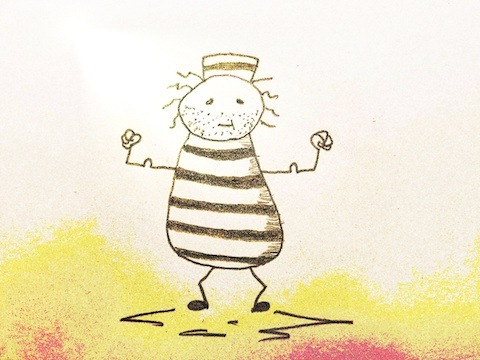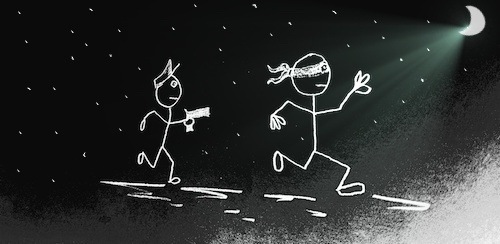I got my start in law enforcement as a corrections officer working in a prison designed to house the inmates who’d been classified as “the worst of the worst.” Other institutions couldn’t or didn’t want to deal them, so they sent those little darlings to us. In other words, they were the system’s problem children. Fortunately for the citizens who lived nearby, our place was like Colonel Klink’s Stalag 13 … we’d never had a successful escape. Some tried, but none succeeded.
Not far away, within sight, was another prison. It, too, housed some pretty tough customers, but it also had a substantial population of medium to lower custody inmates. Unfortunately, their escape record was marred by a few blemishes and this was a concern to the locals. After all, a couple of the prisoners there had once beaten a corrections officer to death. Another had violently raped a female officer. Not to mention the inmates who’d killed or maimed other inmates. So yeah, escapes were always on the minds of everyone, including the inmates who had freedom on their minds.
As officers, escapes meant something entirely different to us than the heart-pounding fear experienced by private citizens. Sure, the safety of our neighbors and fellow staff were a concern, but it was the other stuff that went along with total chaos that followed the discovery of a missing inmate that really bugged us.
For example:
The Day the Alarm Sounded … ESCAPE!!
1. Count time and the final tally came up one man short. So officers counted again and again and again and again and again until someone “upstairs” was finally able to comprehend and embarrassingly admit that a prisoner was not where he was supposed to be. This process could and did last up to 30-40 minutes, or so.
2. The way it worked was when a count came up short, inmates, if not already there, were sent to their cells and locked inside. Those at work were generally ordered to assemble in a central and secure spot and were to remain there until further instructions were provided, which usually meant an escorted trip back to their assigned cells. A top-to-bottom search of the buildings and grounds was then initiated.
The place was a madhouse, with employees frantically turning every stone, bush, mattress, clothing pile, and garbage can. Inmates shouted and cheered for their missing compadre, even if they’d never seen the guy before in their entire lives. They banged and shook their cell doors, tossed things out into the corridors and dayroom areas. Some flooded their cells to add to the confusion, hopefully to provide enough distraction to aid in the escape attempt.
3. During an actual escape attempt, an hour of internal searching could easily pass before the brass swallowed their pride and made THE call to the regional office.
4. The order is given to sound the siren—a shrill, even more piercing than a fire siren noise that reached for miles—alerting everyone, including neighbors and other nearby prisons that an inmate has indeed escaped. And this is where the real pucker-factor for lower level officers sets in because …
5. Officers are at their assigned posts, guarding the remaining prisoners (watching them play cards and dominoes while yelling and cheering for their new hero) when they see a handful of White-shirts approaching (superior officers are called White-shirts at our state prisons because they wear—wait for it—white shirts). The bosses point at various officers as they pass by. First one then another, like selecting the top canines in a dog show.
6. The pointed-at officers are now part of the search team. These selections were based on absolutely nothing more than an eenie-meenie-miney-mo type system. Time on the job, marksmanship, alertness … they meant nothing. Warm bodies were what’s needed at the time. And they grabbed officers from nearby prisons as well. It’s all hands on deck time. The stuff had hit the fan.
7. So off they go to the armory, those unfortunate “hand-picked” officers, where they’re issued a sidearm and sometimes a shotgun, depending upon how many were on hand and how many were in decent working condition.
8. The recently-armed officers are loaded into smelly vans and buses, packed in like the sardinish inmates who’d ridden in those very vehicles just hours before. Keep in mind, corrections officers do not carry firearms while working inside the prison walls/fences; therefore their shooting skills could be woefully inadequate.
Meanwhile, back at the prison, all time off and other leave is cancelled for all officers. And, no one is allowed to leave their posts until further notice. No one goes home. In fact, more officers are called in to assist.
9. The vans and buses head out to the roads surrounding the prison and the wooded areas between. The vehicles stop at regular intervals to drop off an officer who is to stand there until someone returns to retrieve him/her. Might be hours. Could be a day or more. I’ve been posted on street corners in the pouring rain during the wintertime, and I’ve stood in a wooded area all night long, without a flashlight.
10. Speaking of nighttime manhunts … when the sun falls during a southern summer, mosquitoes the size of small buzzards come out to dine on a guard’s exposed flesh.
11. The officer, including me during the night I was posted in that dark wooded spot, really wishes that supervisors would be kind enough to hand out a flashlight or two. This is especially so in the spots where it seemed likely that Count Dracula or some Hulk-like creature who’d spent the past twenty years beefing up on the rec yard, hoping to get a chance to crush a guard’s skull like an overripe melon, would leap from behind a bush at any moment.

Oh, and something to eat and drink at some point would be a nice touch. A portable radio to scream for help, if needed, would also be welcome.
12. Midnight approaches, as does something from dark bowels of the wooded area. Calm down Telltale Heart, it’s only a deer.
13. A prison van finally drives up at 1 a.m. The driver, a White-shirt who’s enjoying an air-conditioned ride, rolls down his window to ask the officer if he’s seen anything. He’s holding a bottle of Diet Coke and promises someone will be by soon to relieve him. Doesn’t offer even a swallow of the beverage. The scent of some sort of warm food wafts to the officer from the open window. Mr. White-shirt drives away as you watch the van’s headlights fade to black as the vehicle rounds a curve.
14. An hour later another van pulls up and the driver tells the officer to get inside. The officer is told the search area has been expanded and they’re moving him to an area 20 miles away. Still no food or drink.
15. Twenty-four hours later the officer is standing in front of a house in a residential neighborhood, twenty-six miles from the prison. It’s raining very hard. No rain gear. Thankfully, the homeowner brings hot soup, a ham and cheese sandwich, and a thermos filled with black coffee.
16. Now thirty hours have passed since the escape siren sounded. A prison van rolls to a stop in front of the exhausted officer and the driver tells him to get inside.
17. The prisoner was located 250 miles away, traveling in a vehicle owned by a prison kitchen employee. She was driving the car at the time it was stopped by state police.
18. The officer, wet, tired, and still hungry, learned that officials suspected the kitchen worker all along and had alerted police to locate her.
19. The officer also learned that his bosses had stationed him and his co-workers throughout the countryside as merely a precaution in case the other “thing” didn’t pan out.
20. And that is why we hated escapes. Well, that and the fact that psycho-killer was roaming the streets.
And the mosquitos … and the Hulk, and Dracula, and that scary deer.
*Remember, it was a long, long time ago when I worked as a corrections officer. I’m sure times and things have changed a bit since then. However, I’d be willing to bet a dollar to a cop’s doughnut that forced overtime and poor treatment by administration still occurs and is something that’s despised by many of today’s corrections officers.


